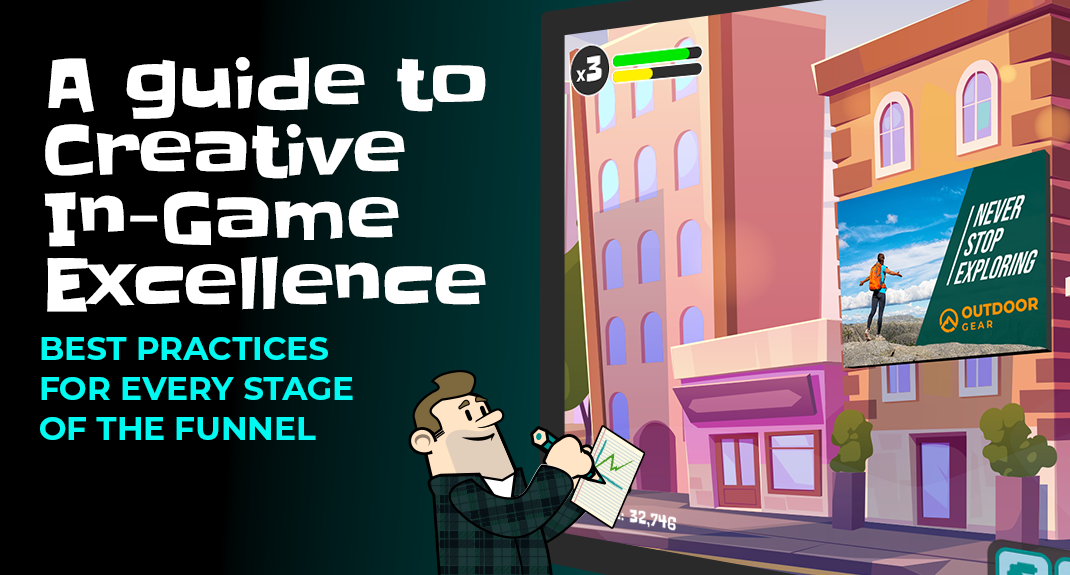- News
- >
- In-Game Ad Creative Best Practices Boost Brand Recommendation by 21% and Purchase Intent by 9%

In-Game Ad Creative Best Practices Boost Brand Recommendation by 21% and Purchase Intent by 9%
New research reveals enhanced bottom-line performance for in-game ads following five or more creative best practices
June 27, 2024 — Anzu, the world’s most advanced intrinsic in-game advertising platform, today published a study revealing how intrinsic in-game ads see significant bottom-line performance lifts when following five or more in-game creative best practices. The research builds upon the Creative Guidelines and Best Practices in Advertising in Gaming report, updated by the Internet Advertising Bureau (IAB) in March 2024, which included contributions from Anzu and other market leaders.
To test the efficacy of the creative guidelines, Anzu’s Creative Director Simon Sworn scored 55 intrinsic in-game ad campaigns from global brands, including Sony, Levi’s, and Tommy Hilfiger. This was done to understand whether past campaigns adhered to these guidelines without knowing how the campaigns had performed. These scores were then matched against the brand lift studies of each campaign, which had over 15K respondents, to determine which best practices drive different campaign outcomes depending on advertisers’ desired impact in the marketing funnel.
Sworn commented, “Due to the immersive and attention-rich nature of the gaming world, creativity must remain a critical area of focus for advertisers seeking to make a meaningful impact on players. This research reinforces the idea that intrinsic in-game ads are more similar to out-of-home in terms of creative requirements and require advertisers to take a different approach to that of traditional digital media. I’m confident our work will serve as a critical resource for professionals in the in-game space, providing valuable insights to refer to during the creative planning process, which will help make their campaigns even more effective.”
The research showed that when following the creative guidelines—which consider areas like logo size and prominence, simplicity of messaging, and relevance of the CTA—intrinsic in-game video ads saw a 21% lift in brand recommendation and a 5% lift in purchase intent. Intrinsic in-game display ads saw an 8% lift in brand recommendation and a 9% lift in purchase intent. The study included an analysis of which creative elements were most important for driving results at different stages of the funnel.
Karan Makwana, Digital Marketing Manager, Middle East & Africa at Sony, whose ads were part of the research, said, “The gaming space is a 3-dimensional environment and when there are capabilities of creating ads which fit into the environment it is empirical to have them blend seamlessly. A gamer is highly engrossed in the gaming environment and psychologically becomes one with it. The moment they engage with an ad that matches the theme of the game, the advertiser vibes with the gamer with higher chances of recall. We did this with a recent campaign we worked on with Anzu, which resulted in a 42-point lift in brand image, a 39-point lift in ad interest, and a 35-point lift in brand consideration.”
"Advertising in gaming is not just about visibility; it's about creativity. The most effective ads respect the player-first ethos and work with the gaming environment to enhance gameplay. We developed creative guidelines and best practices for advertising in games to help ensure quality and consistency across ad experiences. Anzu’s research shows that this is not only important to bolster publisher trust and protect the player experience but also optimizes campaign success.” — Zoe Soon, VP of the Experience Center at the IAB.
Anzu’s guide, now available for free here, includes all the findings and tips for optimizing in-game creatives. Simon Sworn will also present these insights live at London’s MAD//Fest on July 3.

Nick is Anzu's Content Lead. As a gamer with a background in AdTech, he has a unique perspective on the industry and the in-game advertising sector.